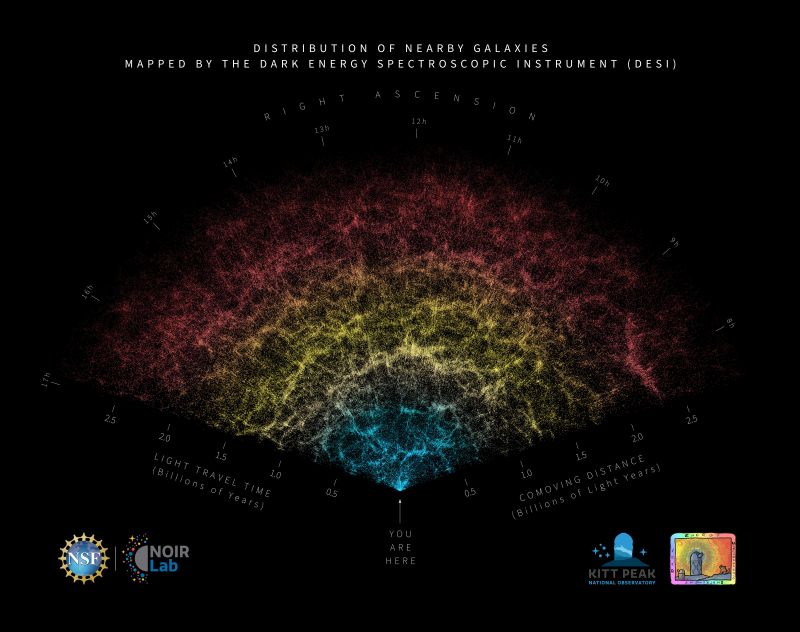Researchers have measured the expansion history of the universe with the highest precision ever, providing a more detailed look at the nature of dark energy and its effect on the universe.
The results are from an analysis of spectra of galaxies and quasars recorded by the Dark Energy Spectroscopic Instrument (DESI). The data is from the first year of a five-year survey which will be used to create the largest 3D map of the universe ever made.
“This project is addressing some of the biggest questions in astronomy, like the nature of the mysterious dark energy that drives the expansion of the Universe,” says Chris Davis, program director for NSF NOIRLab.
DESI is an international collaboration of more than 900 researchers from over 70 institutions around the world. The instrument is mounted on the NSF Nicholas U. Mayall 4-meter Telescope at Kitt Peak National Observatory. The DESI project is managed by the U.S. Department of Energy’s Lawrence Berkeley National Laboratory and funded by the DOE Office of Science.

Credit: DESI Collaboration/NSF NOIRLab/DOE/R. Proctor
A slice of the 3D map of galaxies collected in the first year of the Dark Energy Spectroscopic Instrument (DESI) survey with annotations identifying key features in the map. Earth is at the tip, with the furthest galaxies plotted at distances of 11 billion light-years. Each point represents one galaxy. This version of the DESI map includes 600,000 galaxies — less than 0.1% of the survey’s full volume. Since beginning its survey of the sky in 2021, DESI has observed a new set of up to 5000 galaxies every 20 minutes — often obtaining spectra for more than 100,000 galaxies per night — in its quest to create a 3D map of the universe of unprecedented size and detail.Detailed in several papers, the researchers presented their analysis on April 4. They report that they have measured the universe’s expansion history over the last 11 billion years with a precision better than 1%. Those measurements confirm basic aspects of the leading model of the universe’s structure and expansion, while also uncovering areas to explore with upcoming data.

Credit: DESI Collaboration
Just some of DESI’s 5000 robotic “eyes” which are small lenses on the ends of optic fibers that feed the light from stars and galaxies onto one of ten spectrographs in the basement of the NSF Mayall telescope’s dome.While the expansion history of the universe may be more complex than previously thought, confirmation must await the completion of the five-year DESI project which aims to map over 3 million quasars and 37 million galaxies. As more data are released, researchers will further improve their results.
>>> Read full article>>>
Copyright for syndicated content belongs to the linked Source : Nsf.gov – https://new.nsf.gov/news/dark-energy-survey-looks-11-billion-years-into-past










